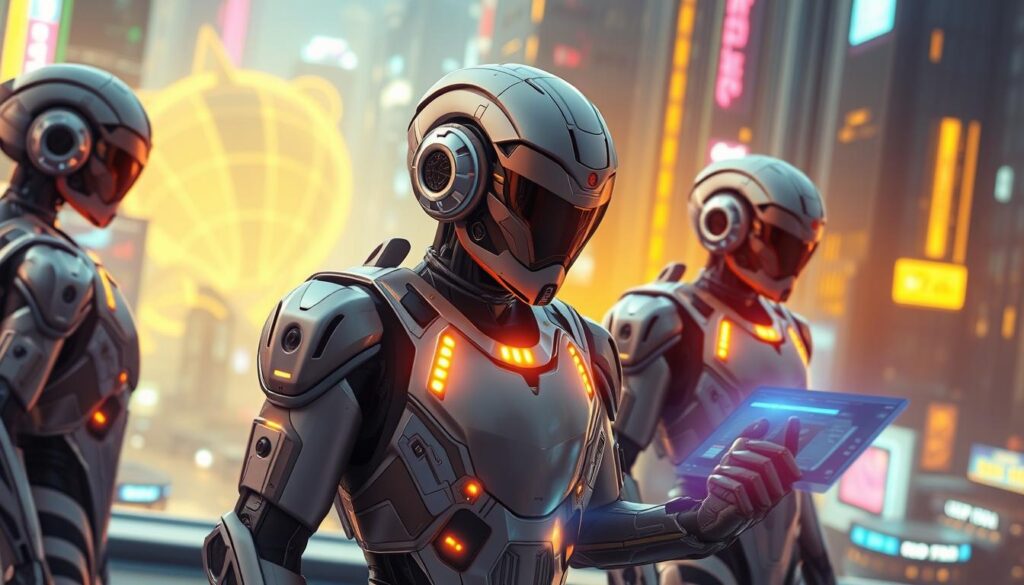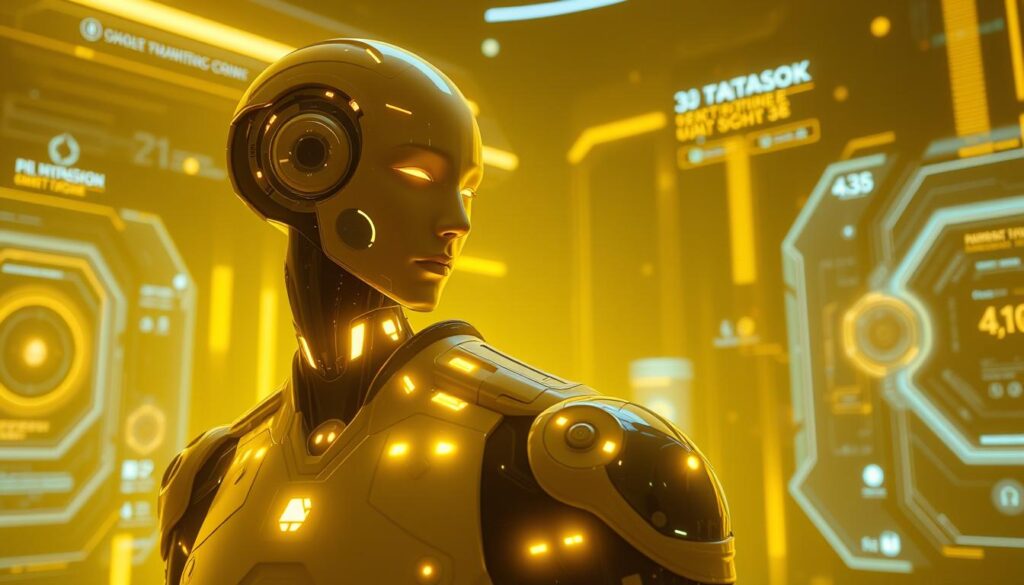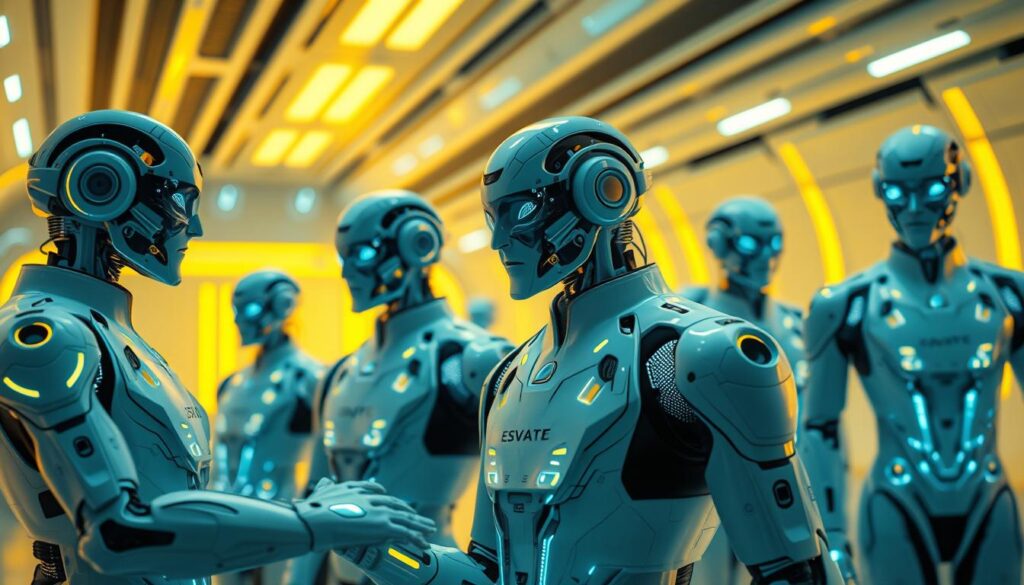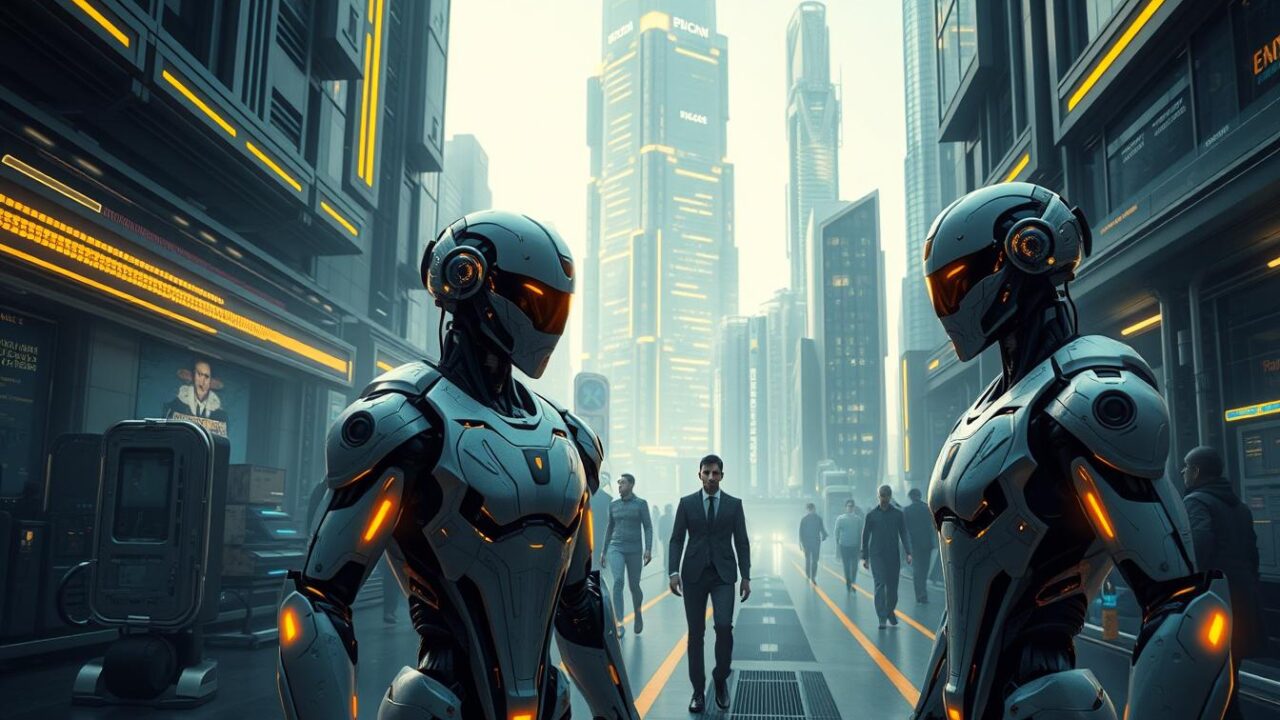Will 2025 bring a new era of artificial intelligence that matches human skills? As AI speeds up, big names are betting on AI super agents. These advanced systems could change how we work, create, and solve big problems.
OpenAI’s Sam Altman and Meta’s Mark Zuckerberg think 2025 might be the start of AI super agents. These AI systems could do tasks as well as top professionals, changing many industries.
The talk about AI super agents is real. A June 2024 survey by Duke University and Federal Reserve Banks found almost 60% of companies are automating human tasks. This trend will likely grow, with AI tackling more complex tasks.
As we approach this AI revolution, it’s important to look at what it means. Is 2025 the year AI super agents arrive, and are we ready for what they bring?
Key Takeaways
- Industry leaders predict 2025 as the potential start of the AI super agent era
- 60% of companies have already implemented task automation
- OpenAI aims to launch a PhD-level intelligent AI by early 2025
- AI super agents could transform job markets within 3-5 years
- Ethical concerns and rapid advancements pose challenges for AI development
- The “Operator” AI agent aims to handle complex, multi-faceted tasks
Understanding AI Super Agents: The Next Evolution in Artificial Intelligence

AI super agents are a big step up in artificial intelligence. They can do more than regular AI agents. They handle complex tasks and make smart decisions.
Defining AI Agents vs Super Agents
AI agents are software that work on their own. They use machine learning to make choices based on data. Super agents are more advanced. They can tackle complex tasks and adjust to new situations easily.
Key Capabilities and Features
Super agents are great at understanding and responding to human language. They use advanced machine learning to get better over time. These smart agents can:
- Handle complex problem-solving
- Interact seamlessly with humans
- Adapt to new scenarios quickly
- Integrate information from multiple sources
According to recent developments, OpenAI is working on an AI super agent. It will have PhD-level intelligence. It can automate tasks, do research, and give expert advice.
Current Technology Limitations
AI super agents have their challenges. These include:
- Ethical concerns about decision-making
- Limited contextual understanding
- Potential for biased outputs
- Need for extensive computing power
As technology gets better, these issues will lessen. This will lead to more advanced and reliable AI super agents in many fields.
OpenAI’s “Operator”: A Glimpse into the Future

OpenAI is about to show off “Operator,” a cutting-edge AI agent. It’s going to change how we talk to AI and use language models. We’ll get a sneak peek in January 2025, and developers will get to try it out.
“Operator” is a big step forward in AI. It can work on its own with web browsers, doing complex tasks with little help from us. OpenAI CEO Sam Altman thinks AI agents will be big in 2025.
- A general-purpose AI tool for web browsers
- A sophisticated framework for multi-agent systems
- Copilot agents for managing complex workflows
There’s a lot of buzz about “Operator.” But, current AI models still have problems. OpenAI’s o1 preview model only got 42% right on the ‘SimpleQA’ test. This shows AI still has a long way to go.
The race to make better AI agents is getting fierce. Google’s “Jarvis AI tool” might come out in December 2023. This competition could lead to fast progress in AI for many areas.
As we get closer to 2025, AI is set for big changes. “Operator” and other tools will start a new chapter in AI and language models. They promise to change how we use technology every day.
Is this the year of AI super agents?

The tech world is buzzing with excitement. We’re on the verge of a big milestone in artificial intelligence. Leaders think 2025 might be the year AI super agents arrive, sparking talks about market readiness and infrastructure.
Industry Leaders’ Predictions for 2025
Mark Zuckerberg has a bold vision for the future. He believes companies like Meta might soon have AI that acts like midlevel engineers. This AI could write code and handle complex tasks, a reality for 2025.
“We could soon release an AI that can effectively be a sort of midlevel engineer that you have at your company that can write code.”
Reid Hoffman also sees a bright future for AI. He predicts AI will become a “agent co-pilot” in three to five years. This will change how we work and interact with technology.
Market Readiness Assessment
The market is ready for AI’s big leap. A June 2024 survey found 60% of companies are already using automation. This shows a growing acceptance of AI assistants across industries.
Technical Infrastructure Requirements
For AI super agents to succeed, strong technical infrastructure is key. This includes:
- Advanced computing power
- Massive data storage capabilities
- High-speed network infrastructure
As we approach this AI breakthrough, a question lingers: Will 2025 be the year of AI super agents? While predictions are hopeful, only time will confirm if 2025 will bring this new AI era.
The Race for PhD-Level AI Intelligence
The world of artificial intelligence is changing fast. Big tech companies are racing to make super-smart AI agents. OpenAI is at the forefront, aiming to create an AI as smart as a PhD by January 30, 2025. This goal is changing how we see machine learning.
OpenAI’s Development Timeline
OpenAI’s plan is bold. They want to introduce AI agents in the workforce by 2025. CEO Sam Altman thinks these agents will greatly improve company outputs. This fast progress is leading to talks about the good and bad sides of in different fields.
Competing Technologies and Solutions
Other tech giants are close on OpenAI’s heels:
- Salesforce sees big gains in productivity with AI in engineering
- Facebook is working on AI that can act like a mid-level engineer
- Microsoft has put billions into OpenAI’s research
Benchmarking Intelligence Levels
It’s hard to measure AI’s smarts against humans. The aim for PhD-level AI is to make systems that can:
- Create working apps from scratch
- Plan for the long term
- Do high-level creative and analytical work
These AI advancements could change industries but also worry about job loss and economic changes.
“By 2025, we may see the first AI agents joining the workforce, significantly altering company outputs.” – Sam Altman, OpenAI CEO
As we move towards PhD-level AI, the effects on society, economy, and jobs are huge. We need to think carefully about these changes.
Impact on Workforce and Employment
The rise of AI super agents is changing the job market. A June 2024 survey found that 60% of companies are now automating tasks that humans used to do. This trend is set to grow in 2025, with companies testing AI agents in their workplaces.
Chatbots and virtual assistants are leading this change. They are making customer service, data analysis, and decision-making faster and more efficient. The coding and software development field is already using AI in their work.
Even though there are worries, most jobs are safe from AI for now. The U.S. jobless rate is 4.1%, showing a need for workers in certain jobs. Workers with AI skills earn $45,000 more than those without.
Companies want to use AI for more than just simple tasks. They are using AI with their own data, which is changing how they work. This means workers need to learn new skills to keep up.
Companies that embrace change and build a culture of adaptability can outperform peers by six times.
As AI gets better, using it wisely is becoming a big deal for leaders. The challenge is to manage this change well, as many programs fail. For every dollar spent on AI, companies might need to spend nine on training people.
The effect of AI on jobs is big, but working with AI is the future. As we look to 2025, we need to find ways to use AI well while helping workers grow and adapt.
Super Agents in Business Applications
AI super agents are set to change how businesses work across many fields. They bring advanced automation that could change how companies operate and innovate.
Automation Capabilities
The power of AI super agents in automating complex tasks is huge. By 2026, they could support $500 billion in economic activity. This growth is faster than the internet, mobile, or social media.
In marketing, IDC expects a 40% boost in productivity thanks to AI tools and CoPilots.
Industry-Specific Use Cases
AI super agents have great potential in many areas. In IT, Microsoft saw a 36% rise in employee self-help success with conversational AI. The finance sector might see AI concierges become common by 2025.
These agents could manage all consumer activities, making them a key part of global commerce.
Implementation Challenges
Despite their promise, businesses face challenges in using AI super agents. Integrating technology, training employees, and changing how organizations work are big hurdles. Companies must also adapt to AI’s fast pace and focus on personalization.
Privacy and data sharing will be important as these agents grow. They aim to secure better deals for consumers while keeping their data safe.
“AI agents will help identify business opportunities and set up meetings,” notes Daniel Newman from Futurum Group, highlighting the transformative potential of this technology.
As AI super agents evolve, they will likely have a bigger impact on business and how we interact with consumers. They will change industries and open up new opportunities for innovation and efficiency.
The Reality Behind AI Super Agent Hype
The buzz around artificial intelligence super agents has reached fever pitch. But, industry leaders are urging caution. OpenAI CEO Sam Altman recently addressed the hype, stressing that expectations should be lowered significantly.
Altman emphasized that creating Artificial General Intelligence (AGI) is not imminent. He suggested cutting expectations by 100 times. This highlights the gap between public perception and the current state of AI technology.
“We’re not going to deploy AGI within the month. The Twitter hype is out of control,” Altman stated during a recent press conference.
While language models like ChatGPT have made significant strides, they remain far from true AGI. OpenAI’s focus remains on improving existing AI chatbots and developing more advanced AI agents.
Looking ahead to 2025, Altman predicts the first AI agents will “join the workforce.” They could potentially impact company output. These agents aim to perform complex tasks independently, with minimal human oversight.
- OpenAI plans to release an AI super-agent on January 30, 2025
- Discussions with US government officials are ongoing
- Microsoft and Salesforce are also key players in AI agent technology
Despite the excitement, it’s crucial to maintain realistic expectations. AI agents show promise in areas like recruitment and process automation. But, their capabilities are still evolving. The journey towards truly intelligent AI super agents is ongoing, with many technical and ethical challenges yet to be addressed.
Economic Implications of AI Super Agents
The rise of artificial intelligence super agents is changing the economic scene. As we wonder if this is the year of AI super agents, their impact on jobs and industries is clear.
Cost-Benefit Analysis
Starting with AI super agents costs a lot at first. But, the long-term gains could be huge. Companies like Meta and Salesforce have seen big savings thanks to AI.
These agents can do complex tasks on their own. This could make many sectors more efficient.
Market Transformation Potential
AI super agents could change old industries. They might take over jobs in software, finance, and logistics. This could mean jobs for some people might disappear.
The goal to make super agents smarter is fast. We need to think about the tech and ethics of this.
Investment Opportunities
AI super agents bring new chances for investors. We’ll need money for training workers for an AI world. Also, investing in AI tech could be very profitable.
“AI-driven productivity could support reindustrialization efforts, revitalizing industries like manufacturing and logistics.” – OpenAI
Thinking about AI super agents’ impact shows their big role in the economy. They could bring a lot of innovation and efficiency. But, we must handle the challenges they bring to ensure everyone benefits.
Technical Challenges and Development Hurdles
The path to AI super agents is filled with big hurdles in machine learning and natural language processing. Getting enough good data is a major problem. AI needs lots of clean, varied data to work well. Also, it takes a lot of computer power to train and run these advanced AI models.
Another big challenge is making AI that can learn across different areas. Current models do great in set situations but fail in unexpected ones. For example, AI agents see big drops in success when faced with open-ended tasks.
There are also big worries about AI’s ethics and safety. Some OpenAI workers are concerned about how fast AI is getting better. They say we need strong tests and checks to make sure AI is safe and reliable before we use it everywhere.
AI can reduce manual effort by up to 90% in tasks such as anomaly detection and vulnerability detection.
But, despite these problems, we’re still making progress. OpenAI’s o3 model got 87% right on the ARC-AGI benchmark, showing it can reason well. Claude 3.5 could even control computers with simple commands. These steps forward in natural language processing and machine learning are exciting. They show us AI agents could get a lot smarter soon.
Regulatory and Ethical Considerations
Artificial intelligence is growing fast, and we need strong rules and ethics. The quick progress of intelligent agents makes us think about who should control them. We worry about privacy and making sure AI is used right.
Government Oversight
AI is getting more attention from governments. In the U.S., 700 AI bills are waiting to be passed. California and Colorado have already made some laws. The European Union is also watching closely, focusing on AI in hiring, defense, and finance.
Privacy Concerns
AI can handle a lot of data, which is a big privacy problem. A study showed AI can copy 1,000 people’s personalities well. This shows how personal info could be misused.
Ethical Implementation Guidelines
AI’s ethics are a big deal. AI might soon make choices for us, which worries many. Experts say we need better ways to check if AI is working right.
The AI market is expected to grow a lot, reaching USD 3,680.47 billion by 2034. This fast growth means we really need good ethics to guide AI’s development and use.
Conclusion
The world of artificial intelligence is changing fast. In 2024, about 400 vendors are working on AI agents. They aim to have solutions ready for businesses by 2025.
These AI super agents will handle tough tasks like customer service and fraud detection. They will help companies deal with the lack of workers.
AI agents won’t replace humans. Instead, they will work with them and machines. This is happening in marketing and customer service, thanks to companies like Hubspot and Salesforce.
Now, the focus is on making AI work across different platforms. Qualcomm, Intel, and AMD are leading this effort. They want AI to work smoothly on all devices.
OpenAI’s Swarm Framework and Anthropic’s AI agents are showing how this is possible. They make AI better at connecting with different apps and devices.
Experts say we’re just starting with AI super agents. Gartner analyst Arun Chandrasekaran calls it “super super early.” As we get into 2025, AI will get smarter, working like mid-level engineers.
The job market will change a lot. Humans will use AI more in their work. Keeping up with AI news will be key for businesses and people.
Want to hire me as a Consultant? Head to Channel as a Service and book a meeting.

